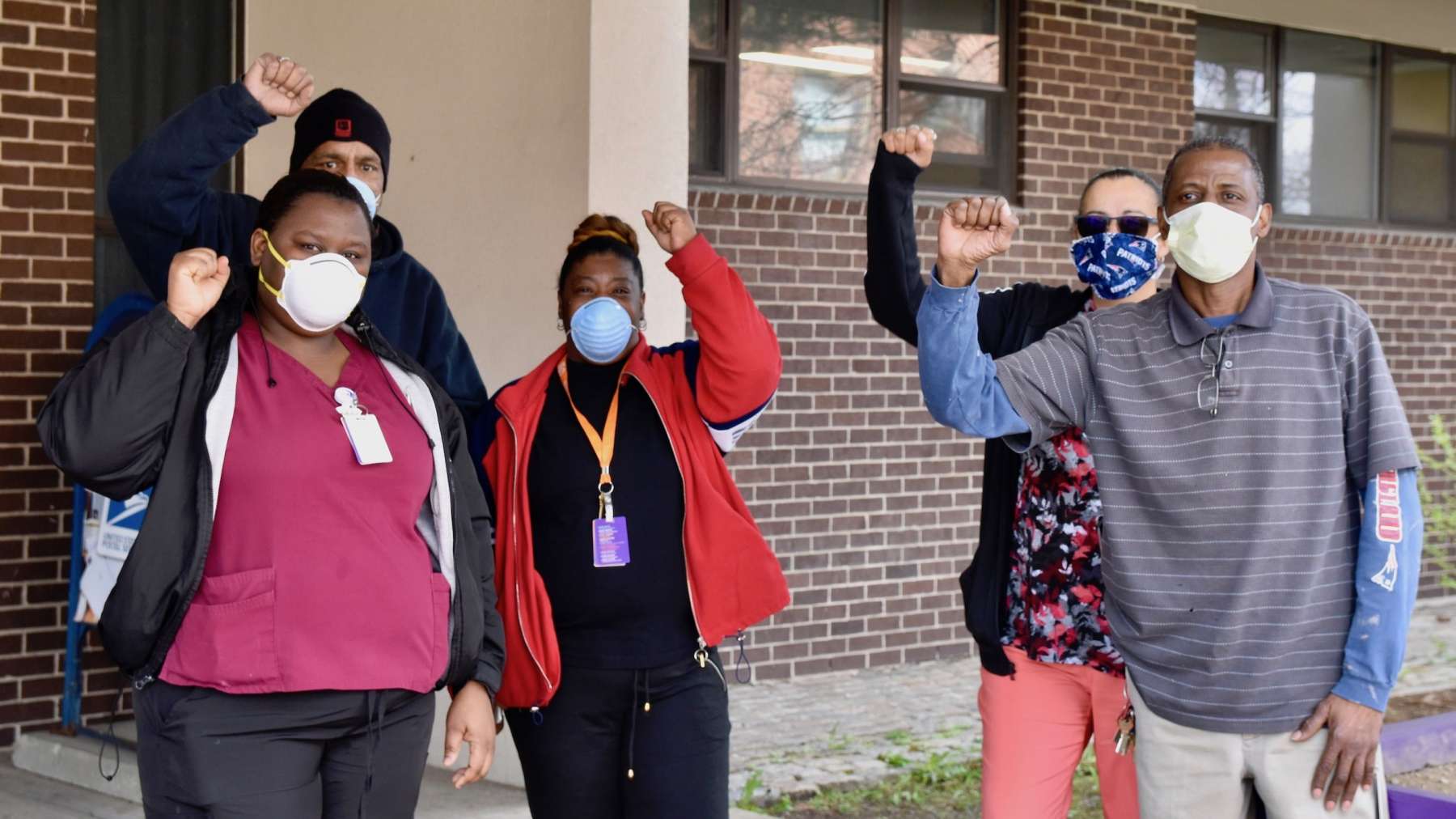Two more nursing homes announce strike deadlines amid National Strike for Black Lives
“It is no mystery to us that systemic racism plays a huge role in the fact that nursing home workers are expected to do the impossible while getting paid poverty wages. The industry has gotten away with it for years because we are overwhelmingly Black and Brown…” Caregivers at two additional nursing facilities – Charlesgate Nursing Center and Bannister House
July 20, 2020, 12:53 pm
By Steve Ahlquist
“It is no mystery to us that systemic racism plays a huge role in the fact that nursing home workers are expected to do the impossible while getting paid poverty wages. The industry has gotten away with it for years because we are overwhelmingly Black and Brown…”
Caregivers at two additional nursing facilities – Charlesgate Nursing Center and Bannister House (both in Providence) – announced their intent to go on strike at 6am on Wednesday, August 5, joining hundreds of other caregivers at three facilities that announced strike deadlines on July 14. Caregivers have pushed back their initial strike date of July 29 to give the new facilities additional time to prepare. Their announcement coincides with the National Strike for Black Lives when thousands of service and care workers will be striking across the country to demand an end to systemic racism that creates poverty wages and unsafe working conditions for a workforce that is disproportionately immigrant women of color.
“It is no mystery to us that systemic racism plays a huge role in the fact that nursing home workers are expected to do the impossible while getting paid poverty wages. The industry has gotten away with it for years because we are overwhelmingly Black and Brown,” said Adanjesus Marin, Lead Organizer for SEIU 1199NE. “On this national Strike Day for Black Lives, nursing home workers are refusing to accept the racist and deadly status quo in their industry any longer. That’s why they are putting themselves on the line to create a better future for their residents, their families and themselves.”
Of the nearly 850 nursing home workers SEIU 1199NE represents in Rhode Island, over 70% are People of Color, according to a 2019 survey. One in three nursing assistants nationally is a Black/African American woman (33 percent) with a growing percentage of immigrant caregivers. What’s more, the poverty rate for women of color in direct care (22 percent) is higher than the poverty rate for white women (17 percent) with 48% of women of color in direct care needing public assistance to survive.
“We have been working so hard, and have been short staffed for so long,” said Lydia Kallon, a Licensed Practical Nurse at Charlesgate Nursing Center. “We have gotten sick and some of us have lost family members. Something has to be done. We don’t want to strike, but if management refuses to listen to us, we will have no choice but to take that step.”
After submitting contract proposals over one year ago that would create safe staffing standards of 4.1 direct-care hours, wage boosts, affordable healthcare and training opportunities, caregivers have yet to receive a meaningful response from management despite risking personal safety for months throughout the COVID-19 crisis. Their announcement follows informational pickets that took place at six different nursing home facilities on Thursday, July 16.
On that same day the House Leadership, including Speaker Nicholas Mattiello and Majority Leader Joseph Shekarchi, passed on a safe staffing bill and announced the creation of a study commission, by acclamation, not a proper vote. That study commission is “dominated by for-profit employers” said Marin, in answer to a question from UpriseRI. “That commission claims that they are going to study the issue. We also know that hundreds of nursing home residents have died during the COVID pandemic and we know that there was a crisis before that… There is no longer a need to study, there is a need to end the status quo. I don’t know what the members of the State house may be planning, but… they need to pass this bill. It cannot wait.”
Rhode Island currently ranks 41st in the country, and last in New England, for the average number of hours nursing home residents receive. The CDC has affirmed for years that infection rates are higher in poorly staffed nursing homes. Rhode Island Governor Gina Raimondo announced her support for legislation requiring 4.1 hours a day of direct resident care at a press conference on July 1. Then on July 13 the Rhode Island Department of Health submitted testimony to the state Senate also affirming their support for the legislation.
“I have been a caregiver for 15 years and I know the staffing shortage did not just happen with COVID-19, we have been dealing with it for many years,” said Shirley Lomba, a CNA at Bannister Center. “Recently, I had to admit my own mother into Bannister Center where I work – she would call me 2-3 times a week because no one could answer her call light in a timely manner. No one should have to wait an hour just to use the bathroom. None of us want to go on strike but we desperately need change and we need it now.”
District 1199 SEIU New England represents 29,000 health care and service workers in Connecticut, Rhode Island, and Southeastern Massachusetts. In Rhode Island, 1199 SEIU NE represents over 4,000 members. 1199 SEIU NE is affiliated with the Service Employees International Union (SEIU) – a union of over 2 million members across the United States, Puerto Rico and Canada. SEIU has been a national leader in pushing the growing Fight for $15 and a Union movement.







